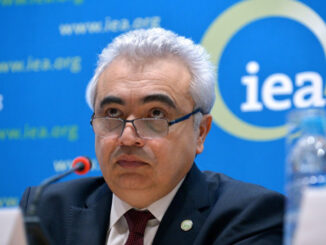
The International Energy Agency’s (IEA’s) latest country report on Turkey and energy policy review notes that Turkey has seen considerable diversification of its energy sector since the previous review in 2016. “Turkey has made significant progress on liberalising energy markets in the last decade, successfully improving predictability and transparency in pricing. However, additional reforms toward establishing more competitive gas and electricity markets will help mobilise needed investments into these sectors,” says IEA Executive Director Dr Fatih Birol in his foreword to the 191-page report.
Since 2016, the guiding principles of Turkish energy policy continue to be market reform and energy security, the report notes. Faced with economic and population growth that have increased energy demand, and increased increase dependence on import, Turkey is restructuring of its energy system. Reforms have included measures targeted at modernisation, liberalisation and increased domestic production capacity, including through more private and foreign investments.
Turkey has seen considerable diversification of its energy mix with renewable electricity generation tripling in the past decade and the commissioning of its first nuclear power facility scheduled for 2023. “Still, fossil fuels continue to drive Turkey’s economy, with a heavy dependency on imports, especially oil and gas (93% and 99%, respectively),” the report adds.
In light of heavy dependence on oil and gas imports, Turkey has prioritised energy security as one of the pillars of its energy strategy. This includes efforts to boost domestic oil and gas exploration and production, diversify oil and gas supply sources and associated infrastructure, as well as reduce energy consumption through increased energy efficiency.
As to nuclear energy, “Turkey has embarked on an ambitious nuclear power strategy to build its first nuclear power plant to limit the use of imported fuels for power generation.” Turkey is planning to install three nuclear power plants (NPPs) for a total of 12 reactor units with the first NPP (Akkuyu NPP) under construction in Mersin Province. State-owned electricity supplier EÜAS will buy around half the nuclear power generated from Akkuyu for 15 years at a pre-determined price. Studies are ongoing for the construction of other NPPs.
The key general recommendations of the report are that Turkey should:
- Gradually phase down power market support mechanisms such as subsidisation and the obligated procurement by EÜAS of a significant share of electricity generation to keep system costs down;
- Significantly strengthen incentives, market mechanisms and access to finance for energy efficiency projects;
- Develop a cross-governmental road map to reduce oil consumption by strengthening demand-reduction and fuel switching policies in the transport sector, including promotion of electric vehicles;
- Foster increased competition in the Turkish gas market;
- Define long-term targets for the development of renewable energies based on the maximum potential per technology; and
- Define mid- and long-term emissions reduction and local air pollution targets to help guide sustainable energy policy, including a plan for peaking of emissions.
The report is divided into three broad sections: Energy Insights (Executive summary and General energy policy), Energy System Transformation (Energy and climate change; Energy efficiency; Renewable energy; and Energy technology research, development and demonstration), and Energy Security (Electricity; Oil; Natural gas, Nuclear; and Coal).
The section on nuclear includes an Overview; History of nuclear power development; Legal framework and institutional oversight; Nuclear safety regulation; Human resource development; Radioactive waste management; and Public communication. In its assessment, the report notes that the planned construction period for Akkuyu 1 is five years, “which seems challenging” especially as it is the first nuclear project in Turkey. It adds that the regulatory authority should carefully prepare for regulatory inspections “and must be ready to respond promptly to unexpected changes and delays” to meet the 2023 commissioning date. Russia’s Rosatom is building the plant on a build-own-operate basis and “Turkish companies are expected to undertake a minimum of 40% of the work, mainly on non-nuclear products”. However, the report says, “the terms of the Akkuyu project are limited in terms of localisation and technology transfer”.
When fully operational, the Akkuyu NPP may cover some 20TWh a year or 5% of the 400 TWh in the market by that time. “This can be a significant contribution to the Turkish electricity market.”
Existing nuclear regulations are being revised by the Nuclear Regulatory Authority (NDK) for adoption to the new regulatory system and to ensure compliance with IAEA and EU requirements. Given NDK’s limited regulatory experience in commercial NPPs it should continue efforts to develop its competency and maintain its independence.
The report notes that, despite the long history of nuclear and radioactive research activities in Turkey, a disposal site for radwaste has not been developed and no candidate site has been identified. This “could create or strengthen negative public sentiment for nuclear power”. A national strategy for final disposal of all kinds of radioactive waste is planned to be established in a National Radioactive Waste Management Plan and a Special Fund Board is to be established to manage the special funds for disposal of used nuclear fuel and radioactive waste and for decommissioning of nuclear facilities. Education and training of operating staff at the Akkuyu NPP are the responsibility of the project management company (APC) and Turkish engineers will account for 30% of the technical staff in the NPP. “Moreover, APC will establish a training centre within the plant site including a full scope control room simulator for the training of future Turkish operating staff.”
The Turkish government is conducting a wide range of activities to increase public awareness and trust in nuclear energy both around the plant sites and at the national level. “Overall, Turkish efforts on the regulatory framework and oversight, human resource development and public relations have been progressing steadily.”
The report recommends that the Turkish government should:
- Support the NDK and the Nuclear Technical Support Co (NÜTED) to ensure that they are fully prepared to completeall remaining inspection, licensing and regulatory procedures for the commissioning of the Akkuyu NPP.
- Ensure continued domestic nuclear capacity building and technology transfer, including by exploring additional partnerships to effectively advance upcoming NPP projects.
- Request reviews of the Turkish regulatory system and activities by the International Atomic Energy Agency and the and the western European Nuclear Regulators Association, to confirm and improve the adequacy and effectiveness of NDK regulatory oversight.
- Establish a strategy for the long-term management of used fuel and radwaste and steadily implement planned activities.



